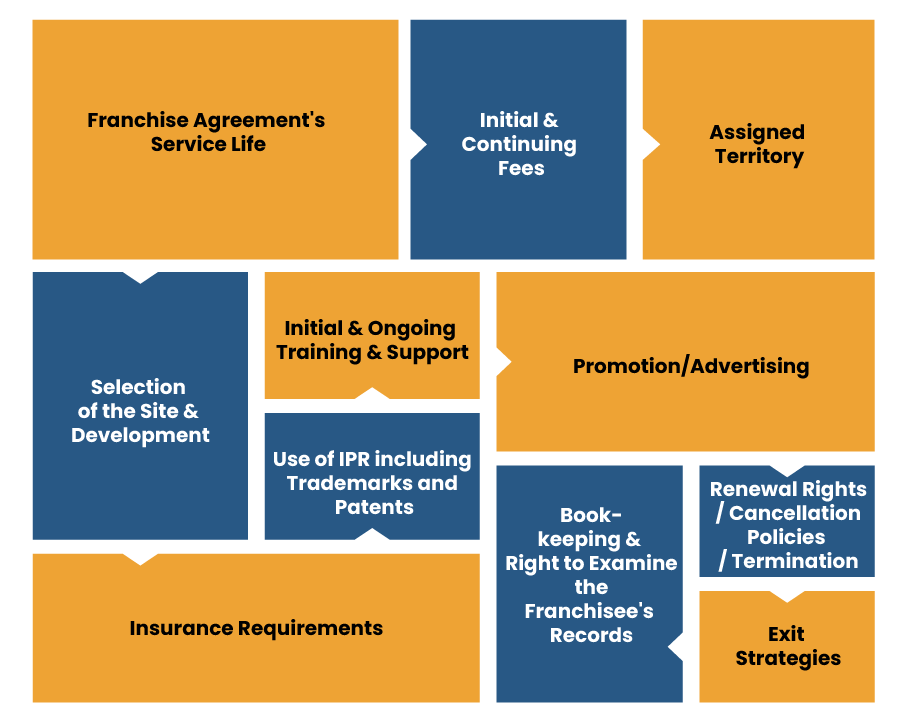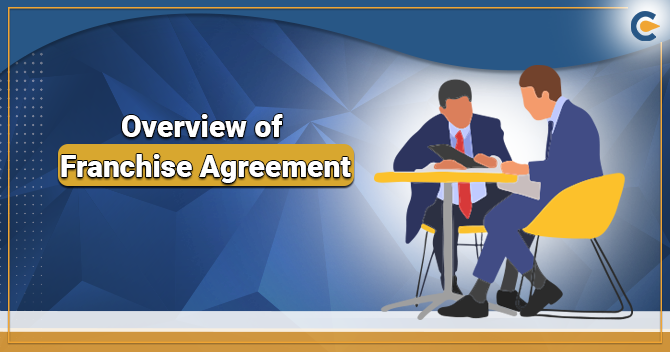A franchise agreement refers to a legally binding document that encloses a franchisor’s terms & conditions for a franchisee. Every franchise is ruled by these terms, which are primarily included in the written agreement between the concerned parties. The franchise agreement will oversee everything on how the franchise pursues the business operation and underpin what they can expect from the franchisor. This article would make you understand the fundamental of a Franchise agreement from the ground up.
Ensuring Transparency of Franchisor’s Intellectual Property
In the business fraternity, the online franchise agreement is referred to as a license that laid out the rights & duties for the franchisor and the franchisee. This agreement is drafted to safeguard the franchisor’s intellectual property (IP) & ensure transparency on how either of its licensees operates under its brand.
Although this business connection is codified in a written agreement, the franchisors require possessing the capabilities to evolve the brand and its customers offering to stay competitive.
The agreements also require being versatile enough to permit the franchisor to make contractual amendments as per the franchisees’ specific needs. But, there are no alterations to the conditions that franchisees must oversee their independently-owned businesses daily w.r.t brand standards.
Legal Connotation of Franchise Agreement in a Real-World Scenario
The franchise agreement requires dealing with some fundamental elements, including but not confined to:
This includes the concerned parties to the contract, overall accountability of the franchisee for operating the business in line with brand standards, and ownership of the IP.
Franchise Agreement’s Service Life


This involves the timeline of the relationships, rights of the franchisee’s successor to enter into new agreements & the need to upgrade the location of the business.
Initial & Continuing Fees
Franchises primarily submit an initial & continuing fee to the franchisor to become part of a business in the form of the franchisee. Agreements also commonly enclose the entire fee structure relating to franchise business. Most franchise systems provide a fund to the franchisor for the product/brand promotion and for other contractually-based purposes.
Assigned Territory
The agreement will showcase whether the franchisee gets an exclusive or protected territory. Territories are vital to confine market saturation. A franchise business will confront issues in an over-saturated area. The franchisee needs to opt for a place that maintains optimal distance from counterparts.
Selection of the Site & Development
Franchisees primarily locate their sites & develop them accordingly based on the franchisor’s standards. The franchisor’s role is typically to render their approval for the site located by the franchisee and then authenticates before the commencement that the franchisee has built the site to meet the prerequisite related to design and brand standards.
Initial & Ongoing Training & Support
In general, Franchisors provide comprehensive preopening & continuing support, which includes training, headquarter support, quality control, and supply chain.
Use of IPR including Trademarks and Patents
The intellectual property[1] of every franchise system is deemed as a valuable asset, some of which is subjected to changes. The agreement reflects what rights are conferred to the franchisee, conditions for the utilization of IP rights, and the franchisor’s right to develop the system via changes to the company’s operating manual.
Promotion/Advertising
The franchisor will disclose its commitment w.r.t cost of advertisement that franchisee has to bear during the contract tenure.
Insurance Requirements
In a franchising relationship, the franchisor might wish that the franchisee have full-fledged coverage over its business operation against potential risks, which could prove detrimental to the operations of the franchisor. Similarly, the franchisee might also want the franchisor to avail an insurance policy for any loss that the franchisee might confront during the franchise agreement.
Book-keeping & Right to Examine the Franchisee’s Records
The franchisor provides the franchisee with stipulates for record-keeping and specific software versions to keep track of account receivable. The conditions might also encompass the franchisor’s right to access and audit the finances.
Renewal Rights / Cancellation Policies / Termination
The franchise agreement clearly explains the conditions related to the renewal and termination of the agreement. This requires, in case of any legal disputes, that an arbitrator examine the case prior to the legal proceedings.
Exit Strategies
Every franchise is meant to leverage an independent resale policy. Some permits franchisees to sell out their franchise under the influence of their permission. These enable the franchisor to buy back the franchise at a rate fixed by them or to match any buyer’s offer.
Among the innumerable issues enclosed on the franchise agreements are franchisee’s successor rights, dispute resolution, indemnification, rights of first refusal, default, sources of supply, roll-up provisions, local advertising requirements, governing law, resale rights, and personal guarantee.
Brief on Pitfalls of a Franchise Agreement
A right franchise agreement excels on consistency, transparency, and uncompromised brand promise. It entails all information vis-à-vis business decisions that laid down a foundation of a franchise system. On the other hand, not every franchise agreement necessarily favors the above traits due to a lack of rights that triggers changes.
Though Franchising is a simple way to go into business for the first time, but it cannot guarantee success unless the franchise is committed to business goals and respects the boundaries drawn by the agreement. Similarly, unclear norms enclosed in the agreement can prove detrimental to both the parties in the future.
In outlining the proper set of agreements, each of the elements needs to be examined thoroughly. Before outlining the contract under the lawyer’s supervision, it is crucial to first draft its business plan & decides on the critical issues. For most franchisors, it is vital to have a lawyer’s support.
Conclusion
A franchise agreement must be outlined by taking mutual benefits of both parties into account, and it should be enforceable in nature. Moreover, they should be prepared in such a manner that avoids costly disputes. Moreover, various clauses are enclosed in the same depending on the business obligations, which also seeks legal prowess to outline a full-fledged agreement.
Read our article:What are the Vital Prerequisites for Setting up Franchise Business in India?











